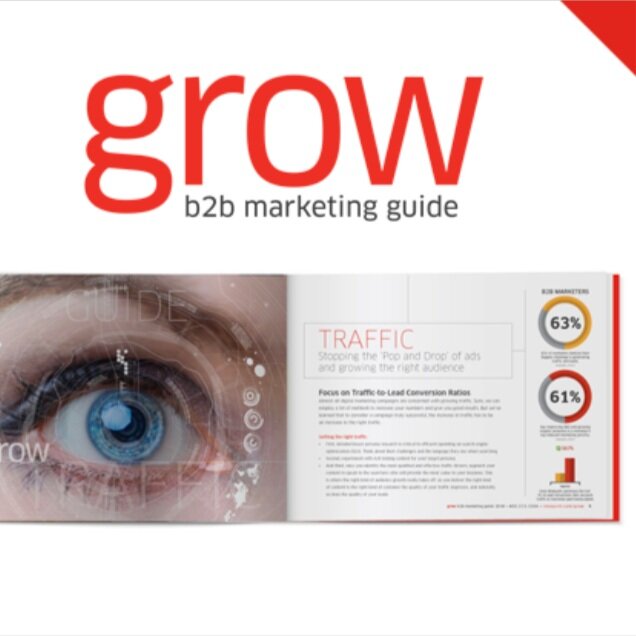 Your B2B SEO strategy might be a constant contender for the most important aspect of your overall digital marketing blueprint, but that doesn't mean that your plan of attack should remain the same. Search engine optimization is constantly fluctuating, and sites like Google are continually updating how they sort and rank websites.
Your B2B SEO strategy might be a constant contender for the most important aspect of your overall digital marketing blueprint, but that doesn't mean that your plan of attack should remain the same. Search engine optimization is constantly fluctuating, and sites like Google are continually updating how they sort and rank websites.
Here are five signs it's time to take a look at your B2B SEO strategy to make sure it's keeping up with the times.
1. You’ve Seen a Sudden Drop in Rankings
In most cases, your position in a search engine results page (SERP) moves gradually. If you've experienced a sudden drop in placement, it's time to take a deep look at your B2B SEO strategy.
If the sudden drop happens shortly after Google releases an update to their algorithm, you should start by checking to see whether Google is now penalizing some strategies that you’re using. Some of the more recent Google updates have prioritized sites that are mobile-friendly and secure, and downgraded sites with too many pop-ups and interstitial ads.
Other possible causes of rankings drops include losing valuable inbound links, making major changes to your website's structure or to previously high-ranking pages, and changing internal links that point to key pages.
2. Your Organic Traffic is Dwindling
Driving traffic to your site with ads, emails, and social media outreach is good, but you should also have a steady stream of visitors that arrive from old-fashioned search. Dwindling organic traffic streams can be caused by a number of problems, so it's important to carefully review your metrics to discover the root of yours.
For example, some of your keywords may attract seasonal traffic, so it's important to either spread out these keywords year-round — which your current B2B SEO strategy should include — or be prepared for highs and lows.
3. The Competition is Heating Up
Whether it's a new business in the market or one that has decided to pour a lot of effort into their SEO efforts, when competitors start creeping up on you, it's time to reorganize. Complacency is an SEO killer, so never get too comfortable when you’re ahead.
When you see the competition sneaking up on you, it's time to reassess not only your keyword strategy, but also the content that's backing it up. Moz suggests creating content that is comprehensive or answers a lot of questions that searchers are after rather than going after one long-tail keyword at a time. Comprehensive pieces are best for broad, information-focused queries that are complex and multi-faceted.
For example, let’s say a user searched "best accounting software." In many cases, a broad search term like this would result in an assortment of results that would only help the person refine their search terms and try again. However, the idea behind comprehensive content is to capture that person during their first search because your page is so packed with info.
To achieve this, consider these points when outlining comprehensive content based on broad search terms:
- Identify all the questions contained in the search. Consider questions based on the background of the searcher and their purpose. In the example of the accounting software, this might include software that's best for home use, small businesses, or large corporations, or software that's best for service-based companies rather than product-based. Keep digging and aim to answer all of these questions.
- Gather exclusive information — or at least information that your competitors aren't talking about or are unwilling to accumulate. This can include proprietary data, competitive comparisons and analyses, expert opinions, aggregated data, and more.
- Offer unique formats. Are you willing to spend several weeks creating a written guide? Your competitors probably aren't. Or, consider visual and interactive formats for delivering your information that might take a lot of planning and effort to create.
While these comprehensive pieces may take a significant amount of resources to build, that's precisely the point, as it's likely to be more than anyone else is willing to do. These pieces are also not meant to replace smaller, more tightly-focused pieces of content; they’re designed to serve as SEO-boosting “pillar” pages that support the rest of your content.
4. Your Backlinks Come from Questionable Sources
We mentioned losing valuable backlinks as a possible cause of losing a previously good rank position in SERPs, but your backlink profile is an important component of your overall B2B SEO strategy. First, if any part of your strategy includes buying lots of low-quality or irrelevant links, stop right now because Google sees them as spammy. If they haven't hurt you yet, your day of reckoning will arrive sooner or later.
Make sure your backlinks are useful and valuable, and make sure you’re removing ones that aren’t. For example, there are some excellent directory sites out there, especially when attached to professional organizations, but most directory sites will do more harm than good to your SEO. Remove any URLs with obvious spam words, or anything that's obviously unrelated. For example, adult entertainment sites are common culprits for irrelevant and potentially harmful backlinks.
Remember, you're always better off with a handful of high-quality, relevant links rather than dozens or hundreds of useless ones. If obtaining high-quality backlinks isn't part of your strategy, it's time to reconsider.
5. You’re Getting Fewer Conversions
If your conversion rate is dropping off, you might not realize that it's because of your SEO strategy. SEO is all about attracting the right kind of traffic, so if overall traffic to your landing pages doesn't seem to have dropped off, but you don't see the conversions you want, it might be because you're drawing in the wrong kind of traffic.
The goal of your SEO and digital marketing strategies is to bring in more sales-qualified leads. If you're ranking highly for the popular keywords in your industry and getting tons of traffic, that's great! But it's only going to pay the bills if they convert.
B2B SEO is a Long Game
While it's good to frequently check in on your metrics to make sure nothing drastic is happening, it's important not to panic if you see a few days with concerning numbers. However, if you've noticed a dip in your key metrics that’s lasted several weeks or months, it's time to reassess your SEO strategy so you stay on top. ![]()







 By
By 
